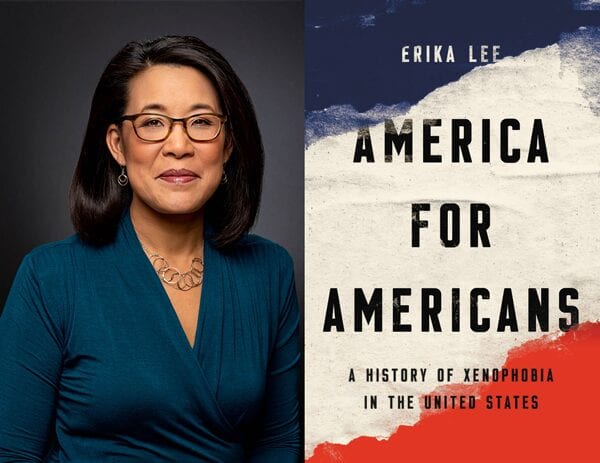Each day leading up to the 32nd annual Minnesota Book Awards Ceremony, we’ll be featuring an exclusive interview with one of our 36 finalists. Learn more about these incredible local writers and gear up to see the winners announced live in person April 28.

Interview with Erika Lee, author of America for Americans: A History of Xenophobia in the United States, part of the General Nonfiction category.
How does it feel to be a Minnesota Book Award finalist?
It is an amazing honor to be a finalist for the Minnesota Book Awards and to be in the great company of the other nonfiction finalists! This year’s finalists across all categories really do represent the state’s diverse community of book authors and its enduring respect for boundary-pushing literature. I am privileged to be on this list!
Tell us something about your finalist book that you want readers to know?
Americans have always debated whether immigration was good or bad for the country. But in 2020, we are more divided than we have ever been before, and we have returned to using explicit racism to define the cruelest immigration policies. I wrote America for Americans to figure out why and how we got to this particular moment in history. And now that I think I know some of the answers, I also realize that we have a very long way to go to challenge, reverse, and abolish xenophobia in America. This problem will not be solved by simply changing who sits in the White House. It will only increase with climate-change-induced migration worldwide. Xenophobia is one of the most pressing challenges facing all of us today, not just in the US but globally. America for Americans demonstrates the urgent need for action. I hope that we can answer the call.
Share something about your writing process and preferences. For instance, where is your favorite place to write?
I was not planning on writing a history of xenophobia. But when it became clear that xenophobia was not only a central theme but also a winning political strategy in the 2016 presidential elections, I found myself struggling to find materials to answer my students’ many questions: “How could we be repeating history?” they asked. “Weren’t we a “nation of immigrants?” How could this be happening in America in 2016, after the civil rights movement; after two terms of our first African American president?”
The morning after the elections, I threw out my lesson plans for the day and hunkered down with my students, many of whom were first generation immigrants and refugees. They shared with me their fears of being deported, being separated from their families, and being victims of hate crimes. I left class that day knowing that I needed to write this book.
America for Americans was the hardest book I’ve ever had to write. Immersing myself in the hate-filled rhetoric of both the past and present every day sometimes made me literally sick. But I also drew strength and courage from the many who have spoken out against xenophobia and who continue to do so today.
What do you love about libraries?
For historians, libraries are like the world’s best candy shop; full of tried-and-true favorites and new discoveries that come in every day. It is the first place that I go when I start writing a book. I begin with the many databases to search for relevant books, articles, newspaper reports, and archival sources. But I also still love to browse the stacks. I always find important new books that I would not have found through online searches alone. For America for Americans, I traveled to research in archival collections across the country and spent even more time researching in digital collections: Benjamin Franklin’s correspondence, the Library of Congress, special collections at the Massachusetts, California, and Washington Historical Societies and at various universities across the country, including the Immigration History Research Archives at the University of Minnesota.
As Director of the Immigration History Research Center (housed in Elmer L. Andersen Library at the University of Minnesota), I see every day how valuable our libraries are to the academic, research, and engagement mission of the university and to our communities. For several years now, the Libraries have been a steadfast partner helping to build, expand, and insure long-term preservation and access to the Immigration History Research Center’s Immigrant Stories project which works with recent immigrants and refugees to create, share, and preserve stories about migration. Our collection – which is on the MN Digital Library as well as the Digital Public Library of America now has 350 stories representing over 50 different groups and a new (and free) digital story-making website that allows anyone to write, create, edit, and share their own digital story. Library staff were also instrumental in helping us create the #ImmigrationSyllabus, a major educational resource and website including major topics, questions, readings, and links to primary sources that offer timely historical perspective on today’s contested immigration debate. It is being used in over 140 countries. As a writer, reader, and educator, libraries are an essential part of my work and life. Thank you, librarians everywhere, for all of the work that you do! And thank you to The Friends of the Libraries for supporting them and us!
Erika Lee is the director of the Immigration History Research Center at the University of Minnesota. She is also the author of The Making of Asian America.
See the winners announced live at the Minnesota Book Awards Ceremony! Presented by Education Minnesota; media sponsor: Star Tribune.


